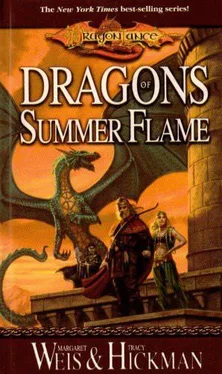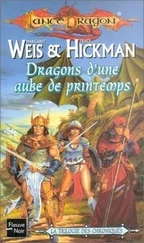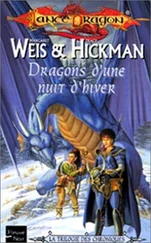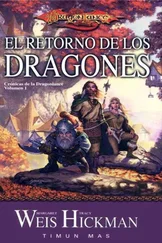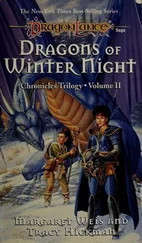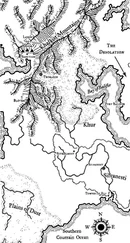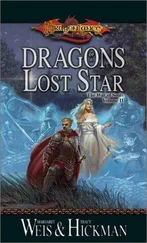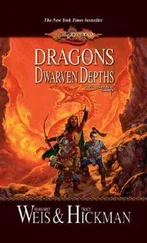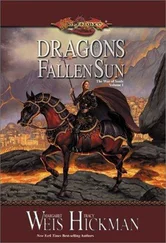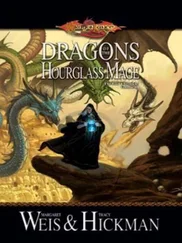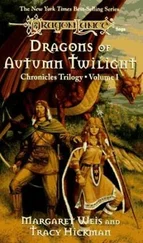Margaret Weis - Dragons of Summer Flame
Здесь есть возможность читать онлайн «Margaret Weis - Dragons of Summer Flame» весь текст электронной книги совершенно бесплатно (целиком полную версию без сокращений). В некоторых случаях можно слушать аудио, скачать через торрент в формате fb2 и присутствует краткое содержание. Жанр: Фэнтези, на английском языке. Описание произведения, (предисловие) а так же отзывы посетителей доступны на портале библиотеки ЛибКат.
- Название:Dragons of Summer Flame
- Автор:
- Жанр:
- Год:неизвестен
- ISBN:нет данных
- Рейтинг книги:4 / 5. Голосов: 1
-
Избранное:Добавить в избранное
- Отзывы:
-
Ваша оценка:
- 80
- 1
- 2
- 3
- 4
- 5
Dragons of Summer Flame: краткое содержание, описание и аннотация
Предлагаем к чтению аннотацию, описание, краткое содержание или предисловие (зависит от того, что написал сам автор книги «Dragons of Summer Flame»). Если вы не нашли необходимую информацию о книге — напишите в комментариях, мы постараемся отыскать её.
Dragons of Summer Flame — читать онлайн бесплатно полную книгу (весь текст) целиком
Ниже представлен текст книги, разбитый по страницам. Система сохранения места последней прочитанной страницы, позволяет с удобством читать онлайн бесплатно книгу «Dragons of Summer Flame», без необходимости каждый раз заново искать на чём Вы остановились. Поставьте закладку, и сможете в любой момент перейти на страницу, на которой закончили чтение.
Интервал:
Закладка:
“Heavens no!” Hiddukel was appalled. “I wouldn’t want such a responsibility! Give it to one of your own number to keep. That would be most sensible, wouldn’t it?”
Chislev regarded Hiddukel intently, but he met her scrutiny with the utmost innocence, exhibiting sincere anxiety over the fate of the world. It is said that Queen Takhisis herself has lost in many deals with Hiddukel.
The result of this conversation was that Chislev left her forest and wandered the world in mortal form. What she saw disturbed her greatly. Steel forges burned angry red in the night; elves polished their newly attained swords; humans counted their money; ogres practiced lopping off heads. Grieved, Chislev determined that something must be done.
Chislev considered discussing this matter with her consort, Zivilyn, the god who can see all planes, all times, future and past. But Chislev knew from experience that it was difficult getting a straight “yes” or “no” answer from Zivilyn, who was always making up his mind to do one thing, then—seeing it from another angle—changing his mind to do something else—seeing that from another angle—and changing his mind again until he finally ended up doing nothing at all.
This matter need action, and Chislev decided to take it. She went to Reorx herself.
None of the gods ever visited Reorx, one reason he spent so much of his time chumming around with humans. He was amazed and pleased to have a visitor, particularly a visitor of such delicate beauty and sweet temperament as Chislev.
She, in turn, was overwhelmed by the attention Reorx paid to her, as he bustled about his disorderly dwelling, preparing cakes, stumbling over the furniture, losing the teapot, offering her anything in the universe she wanted to eat.
Chislev suffered a twinge of guilt, for she saw the god’s loneliness, and reproached herself for having neglected him. Vowing to visit more often in the future, Chislev drank her tea and presented her request.
Reorx was only too happy to comply. She wanted a gem? She should have a gem. A hundred gems! The finest in the universe.
Chislev, blushing, replied that she wanted only one gem, a plain gem, a gem that would hold within it the essence of neutrality.
Reorx stroked his beard, frowned in thought. “And what would that be, exactly?”
Chislev was somewhat perplexed. “Why, the essence of neutrality would be... well...”
“Chaos?” Reorx suggested.
Chislev considered the matter, glancing about somewhat fearfully lest the Father of All and of Nothing—the embodiment of Chaos—should overhear. “Could we capture a small part, do you suppose? Not much. Just enough to anchor neutrality in this world.”
“Consider it done, Madam,” Reorx said with magnificent aplomb. “Where shall I deliver this gem?”
Chislev had long pondered this matter. “Give it to Lunitari. She is closest to the world. She is continually involved with the mortals and their doings. She will be the best to hold it.”
Reorx agreed. He kissed her hand, fell over an ottoman, upset his teacup, and, face flushed, left immediately for his forge.
Chislev, relieved of her worries, returned thankfully to her forest.
How Reorx managed to capture and encapsulate a bit of Chaos into the gem is not known. But, according to what happened later, he was obviously able to do so. He produced what he called the “Graygem” and, when it was finished, took it to Lunitari for safekeeping. She was attracted to the gem immediately, and set the gem in the center of the red moon. She rarely let it out of her sight, for the stone had the strange effect of causing all who looked upon it to covet it.
This included, unfortunately, the gem’s creator, Reorx. Once he’d given the stone to Lunitari, Reorx was disconcerted to discover that he dreamed of the gem nightly. He regretted having parted with it. He went to Lunitari and humbly requested that she give it back.
Lunitari refused. She, too, dreamed of it nightly and liked to wake to see it shining in the red moon.
Reorx fretted and fumed and at last hit upon a way to retrieve the Graygem for himself. Assuming mortal form, Reorx appeared among the race he had created, the gnomes. He chose one gnome, whose inventions had been least destructive to life, limb, and property values, and showed this gnome—in a dream—the Graygem.
Of course, the gnome wanted the gem more than anything else on Krynn, with the possible exception of a multiheaded, steam-driven screwdriver. The latter being unattainable (stuck in committee), the gnome decided to capture the Graygem. How he went about it is told in other stories, but the recovery effort involved a magical ladder, various winches and pulleys, a magical net, and a bit of a boost from Reorx.
Suffice it to say, the gnome captured the Graygem, removing it in a magical net while Lunitari was on the other side of the world.
“Just the thing,” the gnome said, eyeing the stone with admiration, “to power my rotating blade combination pickle slicer and beard trimmer.” The gnome was about to put the stone into the invention when Reorx appeared, in the guise of a fellow gnome, and demanded it for himself.
The two quarreled and, during the argument, the Graygem slipped out of its net and escaped.
This was the first indication that there was more to the Graygem than Reorx or Lunitari or the gnome or anyone else had imagined.
Reorx watched in astonishment as the gem sailed away through the air. He chased after it (so did the gnome and a host of his relations), but none was able to capture it. The Graygem rampaged around Krynn, leaving havoc in its wake. It altered animals and plants, affected the spell-casting of wizards, and made a considerable nuisance of itself.
All the gods were now aware of the Graygem. Paladine and Takhisis were both furious with Reorx for having forged it without consulting them first. Chislev shamefacedly admitted her part in the scheme, implicating Hiddukel, who shrugged and laughed uproariously.
His plot had worked. Instead of ensuring the balance, the Graygem had further upset it. The elves were planning to go to war with the humans, the humans were preparing to go to war against the elves, and the ogres were eager to fight all comers.
To draw this story swiftly to a close, a human named Gargath managed to capture the Graygem. He imprisoned it inside his castle with various magical devices. (Or so he thought. I am of the opinion that the Graygem permitted itself to be captured, for no human magic that I have encountered would have held it for long.)
The gnomes, who had been chasing after the Graygem for decades, laid siege to Gargath’s castle. They succeeded (accidentally) in breaking through the walls. The gnomes rushed into the courtyard and laid eager hands on the Graygem. One party of gnomes demanded that the stone be cut open on the spot, for they were intensely curious to know what was inside.
The other party of gnomes wanted to take the gem back to their dwelling place and hoard it for its value.
A brilliant gray fight illuminated the courtyard, blinding everyone. When people could see once again, they found the two groups of gnomes fighting each other. But what was most astonishing, the gnomes were gnomes no longer. The power of the Graygem had altered them, changing those who lusted after the stone for wealth into dwarves and those who wanted the stone out of curiosity into kender.
Those gnomes who had remained outside the walls of the castle, working on their latest invention—the revolving, mass-firing crossbow, known as the Catling Crossbow, for its inventor, Loosenut Catling—proved immune to the effects of the Graygem’s magical light. They assumed it came from the oil-burning candelabra, which was intended to illuminate the battlefield at night and had been sent up in a gas-filled balloon for that purpose—the gas being produced by a new technique too complex to be described here, but which required lemon juice, metal prongs, and water. Those who survived the subsequent explosion remained gnomes.
Читать дальшеИнтервал:
Закладка:
Похожие книги на «Dragons of Summer Flame»
Представляем Вашему вниманию похожие книги на «Dragons of Summer Flame» списком для выбора. Мы отобрали схожую по названию и смыслу литературу в надежде предоставить читателям больше вариантов отыскать новые, интересные, ещё непрочитанные произведения.
Обсуждение, отзывы о книге «Dragons of Summer Flame» и просто собственные мнения читателей. Оставьте ваши комментарии, напишите, что Вы думаете о произведении, его смысле или главных героях. Укажите что конкретно понравилось, а что нет, и почему Вы так считаете.
